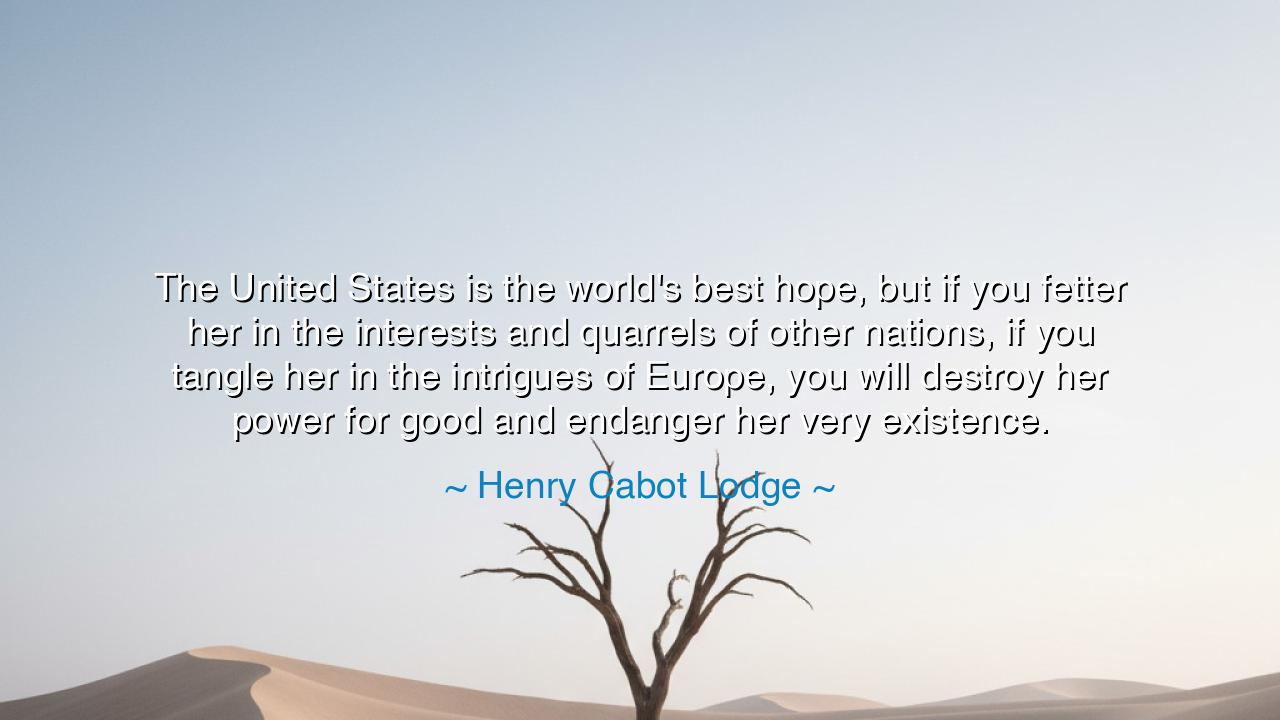
The United States is the world's best hope, but if you fetter her
The United States is the world's best hope, but if you fetter her in the interests and quarrels of other nations, if you tangle her in the intrigues of Europe, you will destroy her power for good and endanger her very existence.






Henry Cabot Lodge once proclaimed: “The United States is the world’s best hope, but if you fetter her in the interests and quarrels of other nations, if you tangle her in the intrigues of Europe, you will destroy her power for good and endanger her very existence.” These words, spoken in the wake of the First World War, echo like the voice of a guardian standing before the gates of destiny. Lodge, a senator of fierce conviction and sharp intellect, uttered them as both warning and prophecy. His message was not merely about the politics of his time, but about the nature of nations themselves — that the strength of any people lies in their independence, their moral clarity, and their freedom from the corruption of foreign ambition.
To understand this declaration, one must return to the year 1919, when the world stood trembling between war and peace. The Great War had ended, but the peace was uncertain, fragile, and full of deceit. President Woodrow Wilson sought to bind the nations together through the League of Nations, a grand vision of eternal cooperation. Yet Lodge, though not blind to the dream of peace, saw danger in its chains. He feared that if the United States surrendered its sovereign will to the intrigues of European powers — nations long entangled in greed, empire, and revenge — it would lose the purity of its purpose. The “world’s best hope,” as he called it, would become merely another pawn in the endless chess game of history.
In his eyes, America’s greatness was not born of conquest, but of principle. It was a land founded not by kings, but by ideals — liberty, self-determination, and the belief that government exists to serve the people, not to rule them. If such a nation were to submerge itself in the ambitions of others, Lodge believed, it would forsake its very soul. For to fetter the United States — to bind her in treaties and entanglements that demanded loyalty to the causes of others — was to weaken the light she was meant to carry. He saw America as a beacon, shining not through domination, but through example. Her power for good depended upon her freedom to act according to conscience, not compulsion.
The ancient philosophers might have recognized in Lodge’s words a reflection of their own wisdom. Just as the Greeks warned that a free city must guard itself from the corruption of foreign influence, so Lodge warned that a free nation must not trade its independence for the illusion of safety. He did not argue for isolation born of fear, but for sovereignty born of strength — for the kind of self-mastery that allows a nation to help others without becoming enslaved to them. His vision was, in truth, an ancient one: that virtue and power are indivisible, and that once a people forget who they are, they are already conquered.
History, too, has tested his warning. When America resisted the call to empire, she remained strong — a symbol of hope for the oppressed and weary of the world. But when she ventured too deeply into the quarrels of nations, she risked her unity and her soul. The tragedy of Vietnam, the divisions of later wars, the weariness of endless conflict — all stand as reminders that Lodge’s words were not meant for his century alone. They belong to all ages, for they speak to the eternal struggle between idealism and ambition, between helping others and losing oneself in their battles.
Yet Lodge’s wisdom should not be mistaken for indifference. To say that a nation must not be tangled in foreign intrigues is not to say that it should turn its back upon suffering. Rather, it must act from strength, not servitude; from principle, not persuasion. When a nation aids others, it must do so freely, guided by justice and conscience, not by alliances that bind its hands or obligations that cloud its vision. True leadership, Lodge believed, comes not from submission to the world, but from steadfastness within it — the same steadfastness that makes a man noble and a people great.
So let this truth endure: the purity of one’s purpose must never be sacrificed to the corruption of convenience. Whether in nations or in hearts, entanglement in the ambitions of others leads only to confusion and decay. The lesson of Henry Cabot Lodge is this — that freedom, once surrendered, is not easily regained. Therefore, guard it as you would your soul. Live by your principles, act with courage, and let your strength serve the world not by yielding to its quarrels, but by shining as a light above them.
For in the end, Lodge’s words transcend their moment. They remind us that every person, like every nation, must choose between independence and entanglement, between clarity and compromise. To live rightly is to walk the narrow path of virtue — to help without losing oneself, to stand firm amid the chaos of the world. For the power to do good, whether in the heart of a man or the heart of a nation, can only be preserved through freedom — and once that freedom is bound, the light that guides the world begins to fade.






AAdministratorAdministrator
Welcome, honored guests. Please leave a comment, we will respond soon